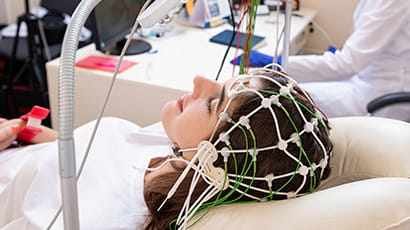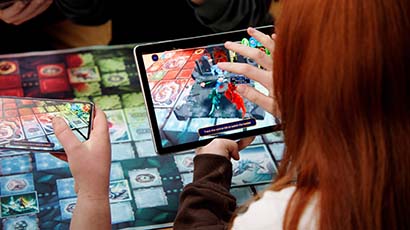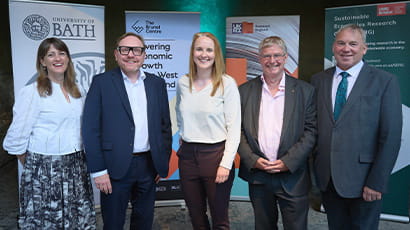Pee Power technology returns to Glastonbury Festival for fourth year

Technology developed at UWE Bristol that converts urine into electricity is set to be showcased at Glastonbury Festival for a fourth year.
An installation of a large 40-person urinal will return to a prominent location near the Pyramid Stage to raise awareness of the system, which is being commercialised as announced last year and introduced to off-grid areas in the developing world.
The PEE POWER® system can turn organic matter such as urine into enough electricity to power lighting or charge mobile phones. At the same time, it sanitises urine and produces plant fertiliser as a natural by-product.
Energy produced at the event will power lighting in the urinal block at night, while a new feature 'Pee to Play' will see festival goers playing retro games on Game Boys powered by the system. Visitors can rate their PEE POWER experience via an electronic display and give survey feedback to academic staff available to explain how the technology works.
The PEE POWER urinals - among 5,500 toilets at the festival - have been a fixture at the event since 2015 and used by thousands of people each day. In previous years, they have powered information displays, and helped charge phones and provide urinal lighting.
Professor Ioannis Ieropoulos, Director of the Bristol BioEnergy Centre at Bristol Robotics Laboratory, said: “It's a great pleasure to be welcomed back to this wonderful event for a fourth year and to be part of the festival's environmentally-conscious sanitation campaign.
“There's been much activity with our technology since our appearance in 2017, with the introduction of PEE POWER to schools in Uganda and Kenya supporting our aim to improve safety and sanitation in the world's poorest communities including in refugee camps and slums. Our system is being refined and made more efficient, and for the first time we will be powering some of the applications directly, which means no batteries. We even hope to be generating surplus electricity, especially during the busiest times at the festival.
“As team of scientists, we're hoping for greater interaction with the public this year and it's the first time we'll be recording public feedback on the system."
Dr Xavier Walter, one of the main researchers in the team, added: "We hope our retro gaming exhibit will resonate with the audience and attract festivals goers to have a look at our technology and ask questions.”
Ahead of the festival, the microbial fuel cell technology will be demonstrated at a Family Day event at Heathrow Airport, where the system is being considered as part of a commitment from Heathrow and waterless urinal technology company WhiffAway to zero emissions and sustainability.
The team's presence at Glastonbury is the result of a close collaboration with partners Oxfam, log cabin and garden building specialists Dunster House and WhiffAway in a collective effort to improve lives in refugee camps and areas of the world with no sanitation or electricity.
Chris Murphy, Owner and Managing Director of Dunster House, said: “It's truly amazing what Ioannis Ieropoulos and his team have achieved over the past years. We feel proud and honoured to be part of this project every year since the earliest field trial back in 2015. From that single raised latrine placed outside the University, we are now providing a structure ready to accommodate up to 40 people. We're glad to be back at Glastonbury 2019 collaborating in a life-changing project that can help people all around the world.”
James McLean, Group CEO of WhiffAway Group, said: "It's an honour and a privilege to be combining our cutting edge technologies at this wonderful event. By putting our heads together we hope to continue making a difference to the wider community and help change the world for the better.”
The PEE POWER demonstration is the flagship research project of a formal partnership between Glastonbury Festival and UWE Bristol signed in 2017 focusing on sustainability projects including waste reduction and energy efficiency.
How PEE POWER® works
PEE POWER® is generated when microbial fuel cells (MFCs) work by employing live microbes which feed on urine (the fuel) for their own growth and maintenance. The MFC taps a portion of the biochemical energy used for microbial growth, and converts that directly into electricity or PEE POWER®. This green technology also cleans the urine so that the by product can be used as a crop fertiliser.
The Pee Power project is funded by the Bill & Melinda Gates Foundation.
Related news

12 December 2025
UWE Bristol’s environmentally conscious and student-focused accommodation wins three awards
Purdown View, the world's largest certified Passivhaus student accommodation development, has been recognised at Property Week Student Accommodation Awards.

25 November 2025
Health-tech start up MyCelsius launches breakthrough cooling tech for hot flushes developed at UWE Bristol’s Launch Space
A pioneering Bristol-based health-tech company developing cutting-edge cooling technology for hot flushes has credited UWE Bristol’s Launch Space incubator with playing a key role in accelerating its product development.

14 November 2025
Lecturer wins prestigious Times Higher Education award for innovation in teaching
A senior paramedic science lecturer at UWE Bristol has been named the most innovative teacher of the year in the Times Higher Education Awards 2025.

13 November 2025
Alliance Medical and UWE Bristol launch UK’s first PET-CT postgraduate certificate
In a move set to transform imaging education, Alliance Medical (AML) and UWE Bristol have joined forces to co-design and develop the UK’s first PET-CT Postgraduate Certificate (PG Cert).

13 November 2025
New AI research to revolutionise animal welfare
A UWE Bristol research project will combine behavioural science and AI to create technology that understands not only what animals do, but how they feel.

29 October 2025
UWE Bristol academic unveils breakthrough in energy-efficient AI at NATO science forum
Dr Jonathan Lancelot has developed a new form of AI that could transform how intelligent machines operate in space, defence, and remote environments.

07 October 2025
Academic playing role in project to find hidden graves in Mexico using drone technology
A UWE Bristol lecturer is playing a part in a project using drone technology to locate concealed graves in Mexico.

01 October 2025
New funding for researchers to develop trustworthy clinical AI for assessing brain activity
Researchers have received funding from UK Research and Innovation to help bring their innovative brain-monitoring AI technology closer to real-world use.

11 September 2025
New study to investigate augmented reality as an intervention for emotionally based school avoidance
A UWE Bristol researcher will support a new study exploring whether an augmented reality board game can help young people with emotionally based school avoidance (EBSA).

22 August 2025
A decade of Future Space: How UWE Bristol’s enterprise zone is powering innovation and economic growth
Tracey John, Director of Research and External Engagement, reflects on the impact of Future Space and its role as a launchpad for cutting-edge companies shaping the future of how we live and work.

11 July 2025
Wound dressings developed with support from UWE Bristol to be launched by global firm
Technology that a team of UWE Bristol scientists helped develop to aid the healing of chronic wounds will be used in new ‘smart dressings’ being launched by global medical company.

03 July 2025
Research lab The Brunel Centre opens to power sustainable and inclusive growth for the West of England
A new data and research centre designed to support sustainable and inclusive growth and industrial strategy in the region, has officially launched.






